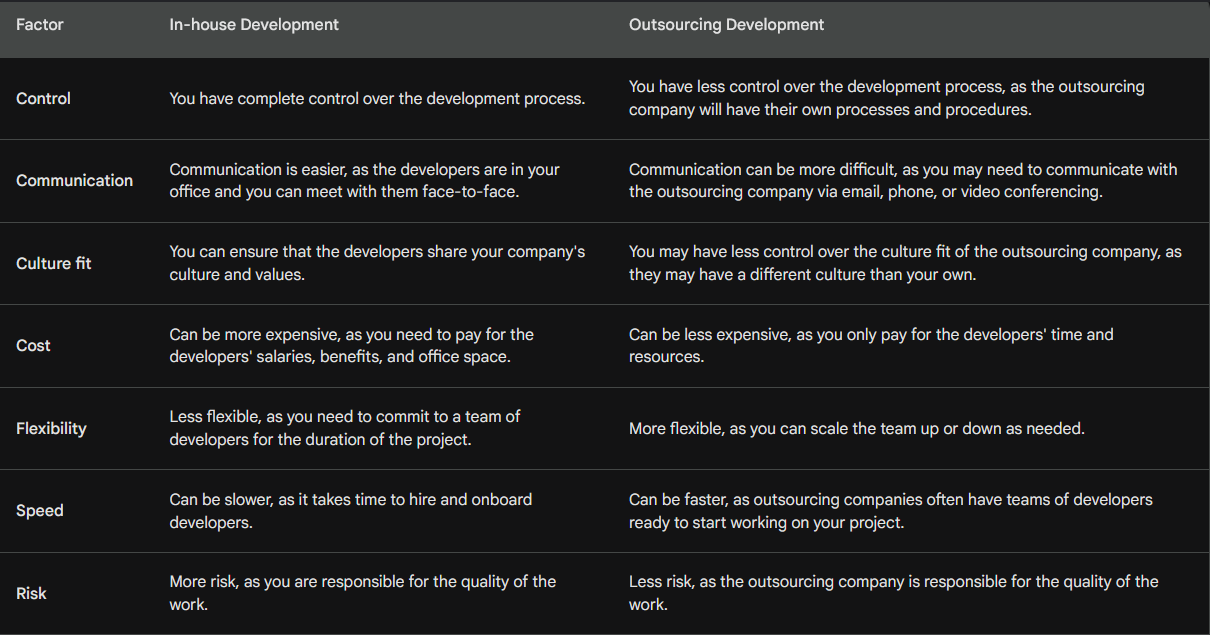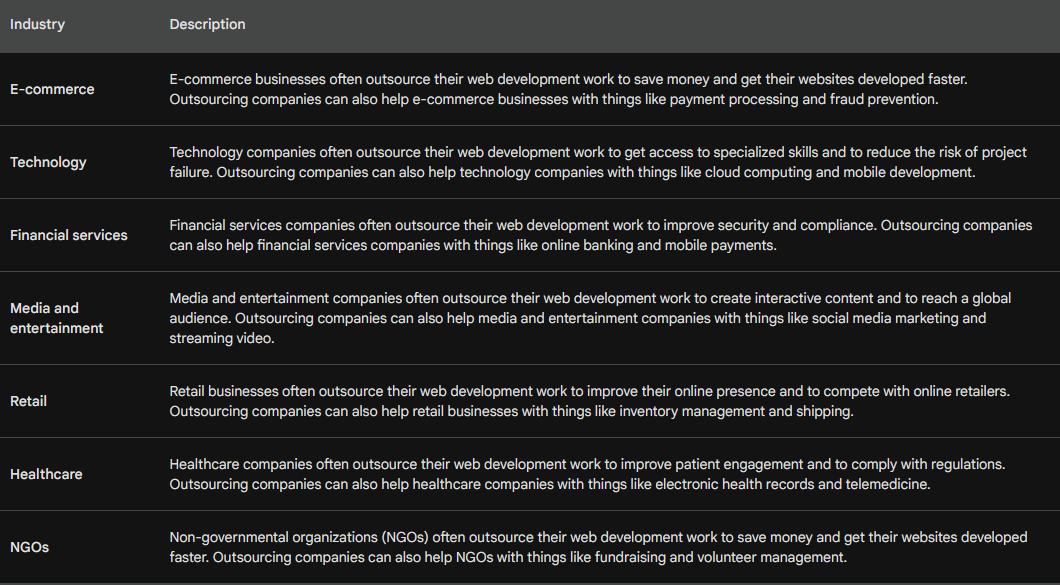The Cost-Effective Alternative to Hiring an In-House Developer

Web development is crucial in driving innovation, efficiency, and growth. As organizations strive to meet evolving technological demands, the need for skilled developers becomes paramount. Hiring an in-house developer is challenging. From high upfront costs to recruitment struggles and limited expertise, organizations seek cost-effective alternatives to deliver quality results. This article explores outsourcing web development and its benefits compared to hiring an in-house developer.
The Benefits of Hiring an In-House Developer
Hiring an in-house developer comes with several benefits that organizations find valuable. These advantages can make the investment in a developer worthwhile. Let's explore some of the key benefits:
- Control and Direct Communication
One of the primary benefits of hiring an in-house developer is having direct control and communication over the development process. With a developer, you can work closely with them, provide real-time feedback, and control project timelines and priorities more. This level of collaboration can result in greater alignment with business goals and faster decision-making. - Dedicated Resources for Ongoing Projects
The developer is a dedicated resource solely focused on your organization's projects. They deeply understand your company's technology infrastructure, systems, and processes. This familiarity allows them to seamlessly integrate with existing teams, work on multiple projects simultaneously, and provide ongoing support and maintenance. - Customization and Adaptability
Developers offer the advantage of customization and adaptability. They can tailor their work to fit your specific needs and requirements. As they become more familiar with your organization's unique challenges and goals, they can provide tailored solutions that align with your business objectives. Developers are also readily available to address any changes or updates promptly. - Domain Expertise and Long-term Commitment
In-house developers possess domain expertise and industry-specific knowledge. They understand your organization's niche and can develop relevant and practical solutions. Developers have a long-term commitment to your organization. They are invested in the company's success and can contribute to long-term strategic planning and development initiatives. - Enhanced Security and Confidentiality
In specific industries or organizations dealing with sensitive data, having and developer can provide an additional layer of security and confidentiality. Keeping development and sensitive information within the organization's premises can minimize the risks associated with data breaches or leaks. - Team Integration and Company Culture
Hiring an in-house developer allows greater integration into the company's culture and team dynamics. They become part of the organization, building relationships and collaborating with colleagues. This integration fosters a cohesive work environment, enhances teamwork, and promotes knowledge sharing within the organization.
Drawbacks of Hiring an In-House Developer
- High Upfront Costs: Hiring an in-house developer involves substantial upfront costs, including recruitment expenses, onboarding, training, and the necessary infrastructure. These costs can be significant, especially for small and medium-sized enterprises.
- Ongoing Expenses: Beyond the initial investment, employing an in-house developer incurs ongoing expenses such as salaries, benefits, and training. It can significantly strain the company's budget if the workload fluctuates or there is a need for specialized expertise.
- Limited Skill Set and Expertise: Developers may need to improve in terms of skill set and expertise. They might need the full range of skills required for complex projects or emerging technologies, leading to potential delays or suboptimal solutions.
- Recruitment and Onboarding Challenges: Finding and attracting top talent can be time-consuming and competitive. Onboarding and integrating a new developer into the company's culture and systems can also pose challenges, impacting productivity and project timelines.

Quick Comparison in this Chart
The Cost-Effective Alternative: Outsourcing Web Development
Outsourcing web development has emerged as a cost-effective alternative to overcome the challenges of hiring an in-house developer. Here are the key advantages:
- Cost Savings: Outsourcing web development can significantly reduce costs compared to maintaining an in-house team. Companies can access skilled developers from regions with lower labor costs, saving on salaries, benefits, office space, and infrastructure expenses.
- Access to a Diverse Talent Pool: Outsourcing opens the door to a vast pool of talented developers worldwide. Companies can select professionals with specific expertise and experience tailored to their project requirements, ensuring high-quality deliverables.
- Flexibility and Scalability: Outsourcing offers flexibility and scalability in web development. Companies can easily adjust the team size and resources based on project needs. This adaptability allows for efficient resource allocation, ensuring optimal productivity and faster time to market.
- Faster Time to Market: Outsourcing accelerates web development by leveraging the outsourcing partner's experience, standardized processes, and established frameworks. It enables companies to bring their products to market faster, gaining a competitive advantage.
Best Practices for Outsourcing Web Development
Outsourcing web development can be highly effective for businesses seeking cost savings, access to specialized skills, and increased flexibility. Here are some best practices to consider to ensure a successful outsourcing engagement.
- Communication and Collaboration: Effective communication channels and project management tools can bridge the geographical gap. Regular meetings, video conferences, and collaboration platforms ensure seamless communication and collaboration between the outsourcing team and the company.
- Quality Control: Ensuring top-notch quality is vital in any project. It's essential to establish precise project requirements and define specific quality standards. Regular monitoring throughout the project is also crucial. We can guarantee that the software meets the desired standards by implementing a solid quality assurance process, conducting regular code reviews, and following thorough testing protocols.
- Security and Confidentiality: Choosing a reputable outsourcing partner with solid security measures and adherence to industry standards is vital. Non-disclosure agreements (NDAs) and strict data protection protocols safeguard the company's sensitive information.
 Here is a graphic summarizing the industries that outsource their web development work.
Here is a graphic summarizing the industries that outsource their web development work.
Considerations for Decision-Making
While outsourcing web development can be a cost-effective alternative to hiring an in-house developer, there are essential considerations that businesses should keep in mind before making a decision:
- Project Complexity and Requirements: Evaluate your project's complexity and its specific requirements. Some projects require close collaboration and frequent communication, making a developer more suitable. On the other hand, if your project demands specialized expertise or scalability, outsourcing may be a better fit.
- Cost Analysis: Conduct a thorough cost analysis to compare hiring an in-house developer versus outsourcing expenses. Consider the initial investment and ongoing costs, such as salaries, benefits, training, and infrastructure. Assess whether outsourcing can provide cost savings without compromising quality.
- Time Sensitivity: Determine the urgency of your project. Suppose time is of the essence, and you need rapid development and deployment. Outsourcing often provides quick turnaround times due to the availability of skilled resources and established development processes.
- Access to Talent and Expertise: Assess your internal resources and expertise. If you need more skills or domain-specific knowledge within your team, outsourcing can grant you access to a global talent pool with diverse skill sets and expertise.
Key Factors to Evaluate When Outsourcing Web Development
When you're considering outsourcing web development, it's essential to take various factors into account. These factors can help you make a well-informed decision and ensure the success of your outsourcing initiative. Here are some key elements to evaluate in a more human-like manner:
- Expertise and Experience: Take a close look at the outsourcing company's expertise and experience in web development. Check their track record, read client testimonials, and examine case studies to assess their capabilities and industry knowledge. It's essential to determine whether they have worked on projects similar to yours and possess the necessary technical skills and domain expertise.
- Quality and Reliability: Pay attention to the outsourcing company's dedication to quality and reliability. Review their quality assurance processes, certifications, and adherence to industry best practices. Evaluating their ability to deliver projects on time and within budget is crucial. To validate their claims, seek out reviews or references from past clients.
- Communication and Collaboration: Effective communication and collaboration are vital when outsourcing web development. Evaluate the outsourcing company's communication channels, responsiveness, and availability. Look into their project management methodologies, tools, and reporting mechanisms. Make sure they have a clear understanding of your project requirements and can provide regular progress updates.
- Cost and Value: Considering various factors when comparing outsourcing costs to other options like in-house development or alternative outsourcing choices is crucial. Evaluate the pricing structure of the outsourcing company, including payment terms and any additional expenses involved. It's essential not to focus solely on cost. Consider the value proposition provided by the outsourcing company, which encompasses their ability to deliver high-quality results and offer long-term support.
- Intellectual Property Protection: Understand how the outsourcing company prioritizes the protection of intellectual property (IP). Assess their data security measures, confidentiality agreements, and policies regarding code ownership and other assets. Ensure they have a robust system in place to safeguard your sensitive information and maintain the confidentiality of your project.
In Summary
Outsourcing web development is a cost-effective alternative to hiring an in-house developer. Organizations can make informed decisions about their development needs by considering the benefits, drawbacks, and case studies of successful outsourcing. Exploring hybrid approaches and continuously evaluating and adapting strategies will empower organizations to effectively achieve cost savings, access specialized expertise, and achieve their web development goals.
Embracing the strategic alternative of outsourcing can pave the way for growth, innovation, and competitive advantage in today's dynamic business environment.
Ready to see how Flexiblesites.com can revolutionize your web development experience? Schedule a demo today and discover the convenience, expertise, and customization options we offer.